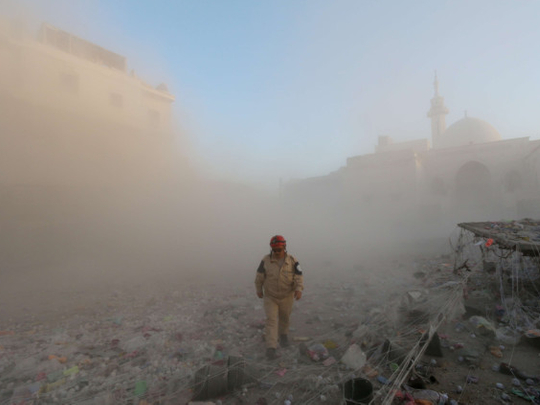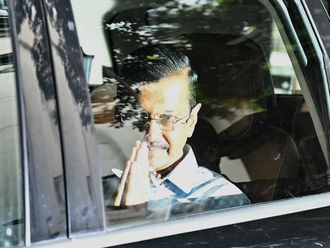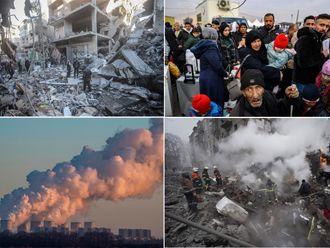
Notwithstanding regular commercial air-links between Damascus and Qamishli, as described by Robert Fisk in the Independent, which presumably illustrated business-as-usual in Syria, the United Nations warned that violent groups successfully recruited foreigners on an “unprecedented scale” — advancing the large figure of 15,000 radicals from more than 80 countries — while the US Central Command (Centcom) attempted to distinguish between the Jabhat Al Nusra and the so-called Khorasan group — a recent invention in its latest air assaults in that hapless country.
Beyond an impeccable state of confusion, mostly of the self-fulfilling variety, such dizzying reports highlighted how seemingly contradictory items actually clarified what bewildered some, but which confirmed how Syria became the crucible of convenient wars.
The Jabhat Al Nusra-Khorasan duopoly was quite easy to decipher and, unlike Centcom claims that they were somewhat dissimilar, in reality, Jabhat Al Nusra was nothing more than an official branch of the so-called Al Qaida under the leadership of one Abu Mohammad Al Julani. A few months ago, Al Julani swore allegiance to Ayman Al Zawahiri, who quickly anointed the Syrian with his perverted blessings. Al Zawahiri backed Jabhat Al Nusra and disavowed Daesh (Islamic State of Iraq and the Levant), when no one knew of the Khorasan group. Lest we forget, US National Intelligence Director James Clapper pulled Khorasan out of his magic hat on September 21, 2014, when he declared that “in terms of threat to the homeland, Khorasan may pose as much of a danger as [Daesh]”.
The confusion went up a notch and while very little information was released about the group, intelligence circles insisted that Khorasan had concrete plans for striking targets in the US and Europe, which was presumably why it became the bull’s eye in recent air attacks on and around Idlib, Syria, where its cadres were allegedly located. A few days ago, warplanes targeted a French bombmaker, David Drugeon, who was apparently linked to the group. Earlier, American citizens were killed in Yemen, which confirmed that western decision-makers felt no compunction about aiming for their own nationals in the name of national security.
What were comical were Centcom’s dubious assertions that its air strikes only targeted the Khorasan group because the latter hijacked the Syrian revolution to conduct attacks against western commercial airliners. The implication of this amateurish claim was that Jabhat Al Nusra’s opposition to the regime was not a shared US/western goal. To its credit, Centcom went after the hardline Islamist militia Ahrar Al Sham as well, especially since the latter assisted Jabhat Al Nusra in its drive against Free Syrian Army (FSA) revolutionaries. Still, it was fair to ask whether some of the recent improvised efforts to relieve FSA fighters and, perhaps, prevent the loss of more of the northern strongholds held by FSA revolutionaries, were the real reasons why the US bombed Jabhat Al Nusra positions in the first place. If that were the case, then the turnaround was truly remarkable, because Jabhat Al Nusra elements occasionally fought alongside the American-supported FSA units too.
In recent fighting, Jabhat Al Nusra forces inflicted serious losses on revolutionary elements, when several FSA-controlled towns fell. Neither the FSA nor groups like the Harakat Al Hazm, which received TOW anti-tank missiles from the US, could long sustain their current casualty rates. Moreover, it would be more difficult to recruit, train and equip additional revolutionaries if groups like Jabhat Al Nusra were allowed to act with impunity.
Washington, or more precisely the Obama administration, was now in a very tough position as it opted for war against Jabhat Al Nusra that risked a near complete alienation of the civilian population, which has fought the government tooth and nail. Indeed, Syrians interpreted the latest strikes as a sign that the US had no intentions of supporting efforts to topple the regime, since these targeted the group that aimed to overthrow the government in the first place.
Few doubted that the latest raids were likely to aggravate internecine divisions. Even fewer suspected that a form of realignment of insurgent forces was under way, which made life impossible for the FSA and, hubris notwithstanding, dramatically complicated matters for Washington. For how could moderate forces prevail when they came under assault from Jabhat Al Nusra and similar groups?
Of course, current US policy focuses on backing Iraq and defeating Daesh, though that is shortsighted. There is a full-fledged war in Syria that requires attention and while extremists in Daesh must and can be confronted, US credibility is on the line. Under the circumstances, writing a letter to Ayatollah Ali Khamanei to seek his assistance in fighting Daesh will not accomplish much of anything, save to further alienate Arab allies. But more importantly, it backstabs pro-American, yes pro-American, moderate Syrian revolutionaries.
President Barack Obama was elected to office because he persuaded Americans that he was smarter than George W. Bush and that he would know how to treat world powers in a way that would enhance US national security and US prestige throughout the world. In Afghanistan, Iraq, Egypt, Yemen, Libya and elsewhere, he pursued Kissengerian realpolitik that was unbecoming. In Syria, he seems to have literally abandoned a hapless nation to a brutal regime, allowing Bashar Al Assad to offer excursion trips to Qamishli. Should we hitch a ride?
Dr Joseph A. Kechichian is the author of the forthcoming Iffat Al Thunayan: An Arabian Queen, London: Sussex Academic Press, 2015.



_resources1_16a45059ca3_small.jpg)





